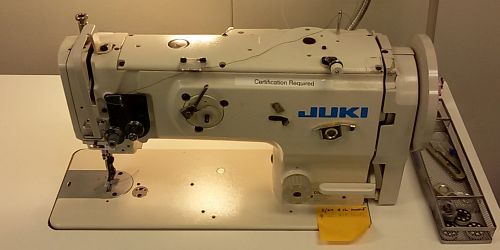Difference between revisions of "Juki 1541"
(First version) |
m (Added a photo and See Also section) |
||
| Line 1: | Line 1: | ||
| + | __NOTOC__ | ||
| + | |||
| + | [[File:TM-Juki-DNU-1541-20201005-medium.jpg|center|500px|Juki DNU-1541 industrial sewing machine]] | ||
| + | |||
= Description = | = Description = | ||
| − | The Juki | + | The Juki DNU-1541 is a single-needle lockstitch '''industrial sewing machine'''. This type of sewing machine has a higher build quality and can sew thicker materials and/or more layers of material than a typical home sewing machine. In addition to feed dogs, the Juki has a walking foot, which is a type of mechanical sewing foot that moves and down (“walks”) across the top material in conjunction with the feed dogs in order to feed the material forward from both the top and bottom simultaneously. This helps to reduce slipping and/or bunching of the top layer, which results in a more consistent and higher quality stitch even with multiple layers of fabric. Note: This machine is only capable of doing straight stitches and cannot do zig-zag or decorative stitches. |
This sewing machine has been upgraded with a variable speed motor which allows the user to choose the speed setting most comfortable for them. | This sewing machine has been upgraded with a variable speed motor which allows the user to choose the speed setting most comfortable for them. | ||
| + | |||
| + | We also have a variety of accessories, such as specialty feet, folders, and hemmers. See the [[Juki Accessories]] page for more information. | ||
= Training Required = | = Training Required = | ||
| Line 14: | Line 20: | ||
* Avoid distractions and keep your hands away from the needle while the machine is running. | * Avoid distractions and keep your hands away from the needle while the machine is running. | ||
* If you run into problems with the machine, post on the #textiles-shop Slack channel and/or contact the shop captain. | * If you run into problems with the machine, post on the #textiles-shop Slack channel and/or contact the shop captain. | ||
| + | |||
| + | === See Also === | ||
| + | * [[Textiles|Textiles Shop]] | ||
| + | * [[Juki Accessories]] | ||
[[Category:Textiles Shop]] [[Category:Sewing]] | [[Category:Textiles Shop]] [[Category:Sewing]] | ||
Revision as of 19:46, 7 April 2023
Description
The Juki DNU-1541 is a single-needle lockstitch industrial sewing machine. This type of sewing machine has a higher build quality and can sew thicker materials and/or more layers of material than a typical home sewing machine. In addition to feed dogs, the Juki has a walking foot, which is a type of mechanical sewing foot that moves and down (“walks”) across the top material in conjunction with the feed dogs in order to feed the material forward from both the top and bottom simultaneously. This helps to reduce slipping and/or bunching of the top layer, which results in a more consistent and higher quality stitch even with multiple layers of fabric. Note: This machine is only capable of doing straight stitches and cannot do zig-zag or decorative stitches.
This sewing machine has been upgraded with a variable speed motor which allows the user to choose the speed setting most comfortable for them.
We also have a variety of accessories, such as specialty feet, folders, and hemmers. See the Juki Accessories page for more information.
Training Required
Users must be trained on this equipment before first use. The purpose of the training is to ensure correct usage in order to protect both the user and the equipment. Classes are scheduled on Meetup on a regular basis — approx. once per month. Users with previous sewing experience can opt for the “fast pass” certification. For details, contact the shop captain.
Safety
Please observe the following safety precautions:
- Apply a small bit of Juki machine oil to each port before each usage.
- Use caution when changing needles. Use only Organ or Schmetz 135x17 needles. When changing the needle, make sure the needle is fully inserted and the flat side of the needle (the “scarf”) is facing to the right. The thread goes through the needle left to right.
- Do not use excessive force when sewing. If the needle doesn’t go through the workpiece easily when turning the wheel by hand, then double-check your setup. Don’t force it – you could break a needle, damage the machine, or hurt yourself.
- Avoid distractions and keep your hands away from the needle while the machine is running.
- If you run into problems with the machine, post on the #textiles-shop Slack channel and/or contact the shop captain.
